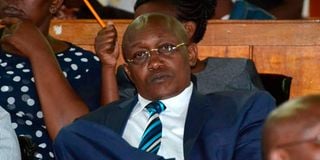Premium
Bank rebuffed in bid to remove restriction on Gakuyo land

Thika preacher and politician David Kariuki Ngari, alias Gakuyo.
A court has dismissed a request by Family Bank to quash a restriction placed by the Assets Recovery Agency (ARA) on a parcel of land linked to Thika preacher and politician David Kariuki Ngari, alias Gakuyo.
Court papers show the ARA blocked any dealings with the 250-acre land in Murang'a in 2019 following claims of fraud and theft of Sh1 billion from Ekeza Sacco by Mr Gakuyo.
The bank wanted the court to remove the restriction so that it can recover a debt of Sh408 million advanced to the registered owner of the property, Chosen Builders Investments Ltd, where Mr Gakuyo is a director.
But Justice Bernard Eboso yesterday said the application lodged by the lender lacked merit as there was no breach of constitutional or statutory frameworks by the ARA in placing the restriction and blocking any transaction involving the property.
"There is evidence that the ARA was investigating a fraud and money laundering case and requested the Land Registrar Thika Land Registry to place the restriction against the suit property. A letter dated April 15, 2019 was exhibited and confirms that indeed the request was made," said Justice Bernard Eboso of the Environment and Lands Court in Thika.
He added that the charge that had been registered by the bank against the land's title was removed on September 5, 2018 and the lender cannot be said to have been a chargee entitled to a hearing before registration of the restriction by ARA.
In the judicial review application, the bank said it loaned the company the money to purchase the property and a charge was registered against the title on April 30, 2015 to secure the loan. But the borrower subsequently defaulted on loan repayments.
When the lender sought to recover the debt, it discovered that a restriction had been registered on the title without the Land Registrar giving them a hearing.
It contended that it has legal interests in the property having wholly financed the purchase.
The bank urged the court to quash the restriction on the land in Mitubiri/Wempa.
The parcel initially measured 300 acres. The piece affected by the restriction is 250 acres after ARA allowed the excision of 50 acres to be compulsorily acquired by the National Land Commission for a landfill project financed by the national government and the World Bank.
ARA placed the restriction on the ground that it was investigating a fraud and money laundering case featuring the property.
Mr Fredrick Muriuki, a police officer attached to the ARA, told the court that the agency received information from the Directorate of Criminal Investigations (DCI) relating to fraud and theft of Sh1,052,746,094 from Ekeza Sacco by Mr Gakuyo, the chairman of the sacco and a director of the company.
He said an inquiry by the ARA established that a sum of Sh1,052,746,094 had been fraudulently transferred from the accounts of the sacco to the personal activities and companies associated with Mr Gakuyo.
Investigations also established that Mr Gakuyo was a shareholder and director of the company, Chosen Builders Investments. Though it was listed as an interested party in the court dispute, the company did not file a response to the bank's application.
The investigator added that it was also established that Mr Gakuyo used proxies such as registered companies in which he was a shareholder to launder the sacco funds through the purchase of properties in the names of proxies.
The ARA's case was supported by the Attorney-General and Thika Land Registrar Joseph Wang’ombe Kamuyu, who stated that the restriction was lawful.





